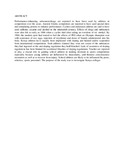| dc.contributor.author | Kamenju, Wanjira J anet | |
| dc.contributor.author | Mwisukha, Andange | |
| dc.contributor.author | Rintaugu, Elijah | |
| dc.contributor.author | Muthomi, Hellen | |
| dc.date.accessioned | 2015-07-15T06:54:20Z | |
| dc.date.available | 2015-07-15T06:54:20Z | |
| dc.date.issued | 2015-06-23 | |
| dc.identifier.citation | Kamenju, Wanjira J., Mwisukha, Andange., Rintaugu, Elijah and Muthomi, Hellen (2015). Influence of sports disciplines and demographics of Kenya colleges athletes on their awareness of doping in sports in Kenya : A cas e of the University of Nairobi. Abstracts of the 2nd AFRICE international conference held at Kenya science campus on 18-23rd July 2015 | en_US |
| dc.identifier.uri | http://hdl.handle.net/11295/87757 | |
| dc.description.abstract | Performance-enhancing substances/drugs are reported to have been used by athletes in competition over the years. Ancient Greeks competitors are reported to have used special diets and stimulating potions to enhance performance. Cyclists and endurance athletes are said to have used caffeine, cocaine and alcohol in the nineteenth century. Effects of drugs and substances were also felt as early as 1886 when a cyclist died after taking an overdose of tri- methyl. By 1904, the modern sport had started to feel the effects of PES when an Olympic champion won with assistance of raw eggs, injection of strychnine and doses of brandy administered into his body. Kenya athletes have equally been implicated with doping and banned and/or suspended from international competitions. Such athletes claimed they were not aware of the substances they had ingested or the anti-doping regulation they had bleached. Lack of awareness of doping regulations has been blamed for accidental bleaches of doping regulations. Teacher are reported to play a crucial role in guiding school athletes in making decision in sports competitions especially because young athletes are influenced by muscularity, and thinness consciousness recreation as well as to recover from injury. School athletes are likely to be influenced by peers, relatives, sports personnel. The purpose of the study was to investigate Kenya colleges’ athletes awareness of doping with respect to demographics and sports disciplines they participated. The study was a cross sectional- survey of 696 male and female teacher trainee athletes participating in national ball games and track and field athletics competition. Study found out that teacher trainees were not aware of the World anti- Doping Code and its regulations neither were they aware of the effects of a selected drug/ substances to sports performance and their health. College athletes awareness of doping was not adequate hence the need to educate them and create awareness | en_US |
| dc.language.iso | en | en_US |
| dc.publisher | University of Nairobi | en_US |
| dc.title | Influence of sports disciplines and demographics of Kenya colleges athletes on their awareness of doping in sports in Kenya : A cas e of the University of Nairobi | en_US |
| dc.type | Presentation | en_US |
| dc.type.material | en_US | en_US |

